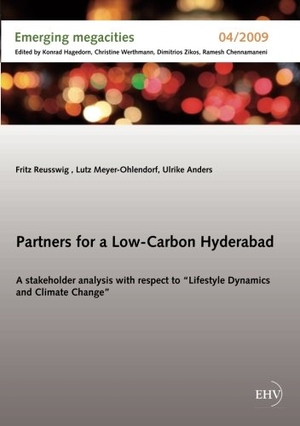Für statistische Zwecke und um bestmögliche Funktionalität zu bieten, speichert diese Website Cookies auf Ihrem Gerät. Das Speichern von Cookies kann in den Browser-Einstellungen deaktiviert werden. Wenn Sie die Website weiter nutzen, stimmen Sie der Verwendung von Cookies zu.
Cookie akzeptieren
Fritz Reusswig / Lutz Meyer-Ohlendorf / Ulrike Anders
Partners for a Low-Carbon Hyderabad
- Europäischer Hochschulverlag
- 2012
- Taschenbuch
- 60 Seiten
- ISBN 9783867418164
This paper analyses the structure of local, regional and national stakeholders that might be relevant for a transition of Hyderabad into a low-carbon megacity. The main angle of the stakeholder selection in this report is de¿ned by the leading question of our research: How do (local) lifestyle dynamics contribute to climate change, and how can lifestyle changes help to reduce local emissions and the vulnerability to global climate change? Our analysis reveals that climate change actually is a medium to low attention issue for the majority of stakeholders in Hyderabad (as in India in general). At the same time, the identi¿ed minority of individual or collective
Mehr
Weniger
zzgl. Versand
in Kürze